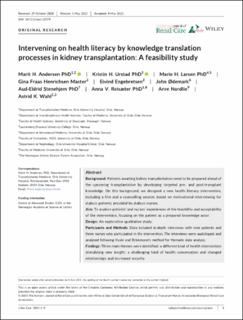Intervening on health literacy by knowledge translation processes in kidney transplantation: A feasibility study
Andersen, Marit Helen; Urstad, Kristin Hjorthaug; Larsen, Marie Hamilton; Henrichsen, Gina Fraas; Engebretsen, Eivind; Ødemark, John; Stenehjem, Aud Eldrid; Reisæter, Anna Varberg; Nordlie, Arve; Wahl, Astrid Klopstad
Peer reviewed, Journal article
Published version
Permanent lenke
https://hdl.handle.net/11250/3051635Utgivelsesdato
2021Metadata
Vis full innførselSamlinger
Originalversjon
Andersen, M. H., Urstad, K. H., Larsen, M. H., Henrichsen, G. F., Engebretsen, E., Ødemark, J., ... & Wahl, A. K. (2022). Intervening on health literacy by knowledge translation processes in kidney transplantation: A feasibility study. Journal of Renal Care, 48(1), 60-68. 10.1111/jorc.12379Sammendrag
Background Patients awaiting kidney transplantation need to be prepared ahead of the upcoming transplantation by developing targeted pre- and post-transplant knowledge. On this background, we designed a new health literacy intervention, including a film and a counselling session, based on motivational interviewing for dialysis patients provided by dialysis nurses. Aim To explore patients' and nurses' experiences of the feasibility and acceptability of the intervention, focusing on the patient as a prepared knowledge actor. Design An explorative qualitative study. Participants and Methods Data included in-depth interviews with nine patients and three nurses who participated in the intervention. The interviews were audiotaped and analysed following Kvale and Brinkmann's method for thematic data analysis. Findings Three main themes were identified: a different kind of health intervention stimulating new insight; a challenging kind of health conversation and changed relationships and increased security. Conclusions Both the patients and the nurses had an overall positive attitude toward the intervention, providing a kind of dialogue to prepare dialysis patients going through kidney transplantation. The nurses found the MI methodology to be challenging. When introducing a comprehensive communication method like MI, potential training and supervision needs for the nurses must be addressed.

